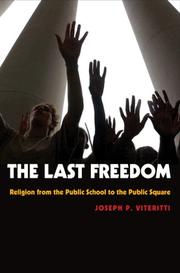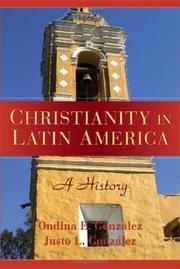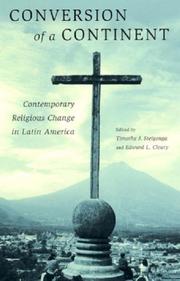| Listing 1 - 6 of 6 |
Sort by
|

ISBN: 1282157361 9786612157363 1400827841 0691130116 9781400827848 9781282157361 9780691130118 6612157364 Year: 2007 Publisher: Princeton Princeton university press
Abstract | Keywords | Export | Availability | Bookmark
 Loading...
Loading...Choose an application
- Reference Manager
- EndNote
- RefWorks (Direct export to RefWorks)
The presidency of George W. Bush has polarized the church-state debate as never before. The Far Right has been emboldened to use religion to govern, while the Far Left has redoubled its efforts to evict religion from public life entirely. Fewer people on the Right seem to respect the church-state separation, and fewer people on the Left seem to respect religion itself--still less its free exercise in any situation that is not absolutely private. In The Last Freedom, Joseph Viteritti argues that there is a basic tension between religion and democracy because religion often rejects compromise as a matter of principle while democracy requires compromise to thrive. In this readable, original, and provocative book, Viteritti argues that Americans must guard against debasing politics with either antireligious bigotry or religious zealotry. Drawing on politics, history, and law, he defines a new approach to the church-state question that protects the religious and the secular alike. Challenging much conventional opinion, Viteritti argues that the courts have failed to adequately protect religious minorities, that the rights of the religious are under greater threat than those of the secular, and that democracy exacts greater compromises and sacrifices from the religious than it does from the secular. He takes up a wide range of controversies, including the pledge of allegiance, school prayer, school vouchers, evolution, abortion, stem-cell research, gay marriage, and religious displays on public property. A fresh and surprising approach to the church-state question, The Last Freedom is squarely aimed at the wide center of the public that is frustrated with the extremes of both the Left and the Right.

ISBN: 9780511803543 9780521863292 9780521681926 9780511367502 0511367503 0521863295 0521681928 0511366914 9780511366918 0511803540 1281146129 9781281146120 0511366280 9780511366284 9786611146122 6611146121 1107178282 9781107178281 0511365659 9780511365652 0511569130 9780511569135 Year: 2008 Publisher: Cambridge Cambridge university press
Abstract | Keywords | Export | Availability | Bookmark
 Loading...
Loading...Choose an application
- Reference Manager
- EndNote
- RefWorks (Direct export to RefWorks)
From the arrival of the conquistadores in the fifteenth century to the spread of the Pentecostal movement today, Christianity has moulded, coerced, refashioned, and enriched Latin America. Likewise, Christianity has been changed, criticized, and renewed as it crossed the Atlantic. These changes now affect its practice and understanding, not only in South and Central America and the Caribbean, but also - through immigration and global communication - around the world. Focusing on this mutually constitutive relationship, Christianity in Latin America presents the important encounters between people, ideas, and events of this large, heterogeneous subject. In doing so, it takes readers on a fascinating journey of explorers, missionaries, farmers, mystics, charlatans, evangelists, dictators, and martyrs. This book offers an accessible and engaging review of the history of Christianity in Latin America with a widely ecumenical focus to foster understanding of the various forces shaping both Christianity and the region.
#SBIB:316.331H382 --- #SBIB:39A10 --- #SBIB:39A74 --- 27 <8=6> --- Geografische spreiding van de godsdiensten: Amerika --- Antropologie: religie, riten, magie, hekserij --- Etnografie: Amerika --- Kerkgeschiedenis--Latijns Amerika --- Latin America --- Church history. --- Arts and Humanities --- Religion

ISBN: 9780813544021 0813544025 0813542014 9780813542010 0813542022 9780813542027 1281316598 9781281316592 9786611316594 6611316590 Year: 2007 Publisher: New Brunswick Rutgers university press
Abstract | Keywords | Export | Availability | Bookmark
 Loading...
Loading...Choose an application
- Reference Manager
- EndNote
- RefWorks (Direct export to RefWorks)
A massive religious transformation has unfolded over the past forty years in Latin America and the Caribbean. In a region where the Catholic Church could once claim a near monopoly of adherents, religious pluralism has fundamentally altered the social and religious landscape. Conversion of a Continent brings together twelve original essays that document and explore competing explanations for how and why conversion has occurred. Contributors draw on various insights from social movement theory to religious studies to help outline its impact on national attitudes and activities, gender relations, identity politics, and reverse waves of missions from Latin America aimed at the American immigrant community. Unlike other studies on religious conversion, this volume pays close attention to who converts, under what circumstances, the meaning of conversion to the individual, and how the change affects converts' beliefs and actions. The thematic focus makes this volume important to students and scholars in both religious studies and Latin American studies.
Conversion --- #SBIB:316.331H382 --- #SBIB:39A10 --- #SBIB:39A74 --- Religious conversion --- Psychology, Religious --- Proselytizing --- Geografische spreiding van de godsdiensten: Amerika --- Antropologie: religie, riten, magie, hekserij --- Etnografie: Amerika --- Latin America --- Religion. --- Conversion.
Book
ISBN: 149850910X 9781498509107 1498509096 9781498509091 Year: 2015 Publisher: Lanham, Maryland : Lexington Books,
Abstract | Keywords | Export | Availability | Bookmark
 Loading...
Loading...Choose an application
- Reference Manager
- EndNote
- RefWorks (Direct export to RefWorks)
Although commonly celebrated as a distinct manifestation of Americana, hippies and psychedelics are routinely de-emphasized in favor of direct political activism, a phenomenon that constrains the full telling of the hippie counterculture as it relates to a radical religiosity defined by mutuality and altruism. Psychedelic Mysticism reevaluates the religious significance of the 1960s psychedelic counterculture, tracing how psychedelics became entheogenic, leading sixties figures to transition personal moments of enlightenment into everyday projects of social justice.
Hallucinogenic drugs and religious experience. --- Hallucinogenic drugs --- Consciousness-expanding drugs --- Hallucinogens --- Mind-distorting drugs --- Psychedelic drugs --- Psychotomimetic drugs --- Psychotropic drugs --- Experience (Religion) and hallucinogenic drugs --- Experience (Religion) --- Social aspects --- Hallucinogenic drugs and religious experience --- #SBIB:316.331H595 --- #SBIB:316.331H382 --- Godsdienstige bewegingen: niet-geïnstitutionaliseerde gedragingen --- Geografische spreiding van de godsdiensten: Amerika --- 316:2 <73> --- 316:2 <73> Godsdienstsociologie--Verenigde Staten van Amerika. VSA. USA --- Godsdienstsociologie--Verenigde Staten van Amerika. VSA. USA
Book
ISBN: 1299356338 1442217316 9781442217317 9781442217294 1442217294 1442217308 9781442217300 9781299356337 Year: 2015 Publisher: Lanham Rowman & Littlefield
Abstract | Keywords | Export | Availability | Bookmark
 Loading...
Loading...Choose an application
- Reference Manager
- EndNote
- RefWorks (Direct export to RefWorks)
Smidt assesses the contemporary social, religious, and political characteristics of evangelical Protestants today. He analyzes the extent to which evangelicals are divided today, and does so within the framework of four potential factors that might shape such divisions: racial/ethnic differences, generational differences, educational differences, and religious differences. Addressing how evangelicals have changed over time, Smidt looks toward the future, addressing generational differences and other possible factors for change among evangelical Protestants.
Evangelistic work --- Evangelicalism --- #SBIB:316.331H382 --- #SBIB:316.331H410 --- Evangelical religion --- Protestantism, Evangelical --- Evangelical Revival --- Fundamentalism --- Pietism --- Protestantism --- History --- Geografische spreiding van de godsdiensten: Amerika --- Morfologie van de godsdiensten: Westerse kerken en denominaties --- Evangelicals in contemporary American society --- the Evangelical tradition in American religious life --- the size and social characteristics of Evangelicals --- the theological bliefs and religious behavior of Evangelicals --- Jesus --- the social theology of Evangelicals --- the civic life of Evangelicals --- Zion --- the politics of Evangelicals --- Evangelism.
Book
ISBN: 1442221070 1442221089 1442223979 9781442221079 9781442221086 9781442223974 Year: 2013 Publisher: Lanham
Abstract | Keywords | Export | Availability | Bookmark
 Loading...
Loading...Choose an application
- Reference Manager
- EndNote
- RefWorks (Direct export to RefWorks)
In Religion, Politics, and Polarization: How Religiopolitical Conflict are Changing Congress and American Democracy, three esteemed scholars trace the confluence of religion and party in the U.S. Congress over time. Drawing on forty years of congressional roll call votes as well as public opinion survey data, the book argues that the ideologies of both the Democratic and Republican parties are grounded in religious values and beliefs that strongly influence the voting patterns of party members. The authors examine several
Church and state --- Legislators --- Religion and politics --- #SBIB:316.331H330 --- #SBIB:316.331H382 --- Congressmen --- Congresswomen --- Members of Congress (United States) --- Members of Congress (United States House of Representatives) --- Members of Congress (United States Senate) --- Representatives in Congress (United States) --- Senators (United States) --- Godsdienst en politiek: algemeen --- Geografische spreiding van de godsdiensten: Amerika --- United States. --- Church and state -- United States. --- Legislators -- United States. --- Religion and politics -- United States. --- United States. -- Congress. --- Government - U.S. --- Law, Politics & Government --- Political Institutions & Public Administration - U.S., Legislative Branch
| Listing 1 - 6 of 6 |
Sort by
|

 Search
Search Feedback
Feedback About UniCat
About UniCat  Help
Help News
News